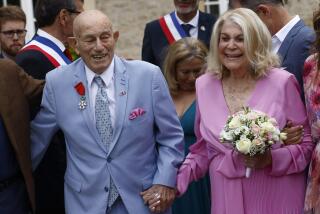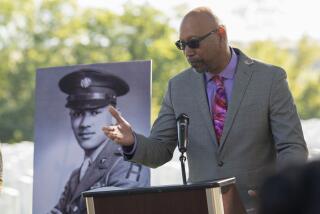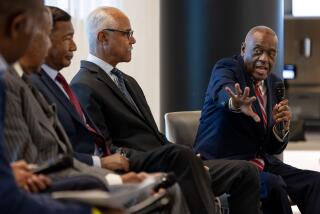American Legion Honors Veteran, 100
- Share via
When American Legion Post 142 of Fullerton recently asked Harold Doud to attend an event honoring longtime members, he turned them down.
He doesn’t get out much, a friend told post leaders. After all, he turned 100 this year.
But the American Legion was keen to honor its oldest member, a retired Army colonel with an extraordinary military career. Doud had served with such distinction, they decided, he deserved more than a 35-year pin. So they held a ceremony at his Fullerton home this month, awarding him an American Legion meritorious service medal.
Age, Doud will tell you, clouds the memory. He’d forgotten he was even a member of the American Legion.
Yet Doud can recite in vivid detail serving with the Occupational Forces in Germany after World War I, his unexpected appointment to West Point, and how he became a decoder of Japanese messages in the days leading up to World War II.
And when his daughter, Nancy Upton, was trying to think of the first name of a dear friend of her father’s from the Japanese Army, Doud quickly answered: “It was Haruo. Haruo Teshema. He gave me his sword after the war, an act of surrender. But I gave it back to him; I just thought it was the right thing to do.”
Doud grew up a poor farm boy known to family members for milking a cow with one hand while reading a book in the other. In 1919, he joined the Army and was immediately sent to Germany. After his service there, a company commander insisted he try for West Point, then helped him get there.
Dancing and horsemanship were his weaknesses at West Point, Doud said. His strength was a penchant for languages--he had become fluent in French, German and Spanish. The Army needed officers who could speak Japanese. So in the early 1930s, Doud and his new bride, Agna, headed for Japan, where he studied the language for four years. The last of those he spent attached to the Japanese 7th Army Regiment, where he befriended Teshema, its commander.
Later, Doud served in Panama, base of the U.S. operations for intercepting Japanese codes. None of them, he said, gave any warning of the Japanese attack on Pearl Harbor.
When America went to war against both Japan and Germany, Doud found himself in an Army that was fighting against good friends in both countries.
Did that bring pangs of regret?
“Not particularly,” Doud said. “It was war. I wasn’t friends with all of Japan.”
But a color painting, taken from a picture, hangs in Doud’s living room. It shows him, in his dress uniform, escorting Agna, wearing her wedding dress fashioned into a gown, as they were about to enter the Imperial Palace to meet the emperor and empress for their 1931 New Year’s ball.
“That was a great day,” Doud said. “You bet I remember that.”
During World War II, where he rose to colonel, Doud continued studying Japanese codes and documents in Australia, New Guinea and the Philippines.
Doud later served in the Korean War, where Japanese-speaking officers were in high demand because most Koreans spoke fluent Japanese.
The career military man retired soon after the Korean War, anxious to spend his later years back home.
In retirement, Doud attended Columbia University for three years, specializing in Far East studies. He also translated into English a Japanese book written by a prisoner-of-war soldier.
He and Agna eventually settled in Virginia. In 1970, they moved to Southern California for Agna’s health. But she died soon after.
Doud stayed an active man for many years, walking five miles a day and driving a car until his early 90s. Then he was hit by a car driven by an elderly driver, which convinced him he ought to stay off the road himself. The injury curtailed his walks too.
He has his own advice for longevity, which he gives with a chuckle: “I try not to work too hard.”


